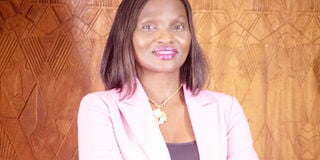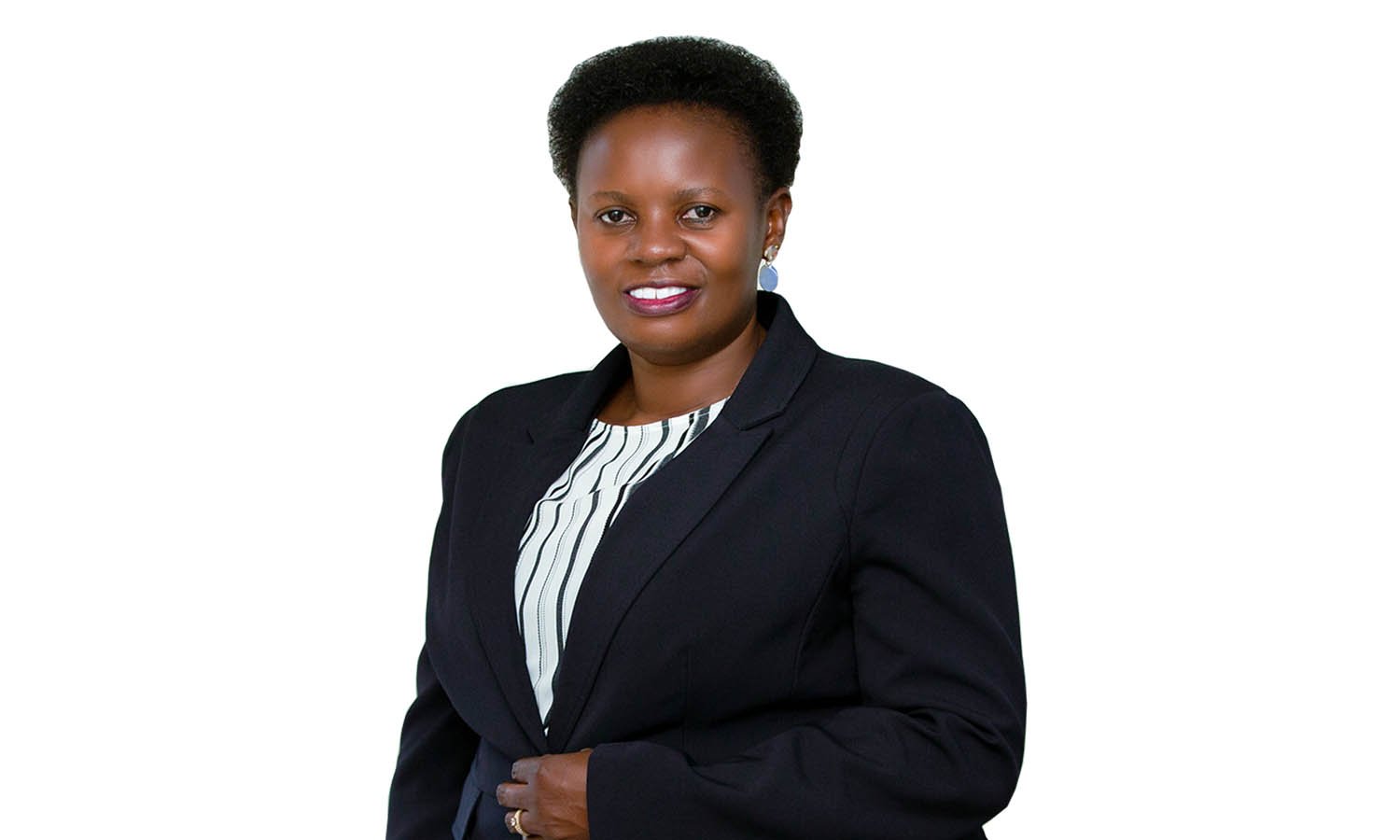Prime
Hard work, a positive attitude and faith in God helped Arimi rise

Barbra T. Arimi. Photo/courtesy
What you need to know:
In order to rise through the ranks of marketing and corporate affairs, she had the relevant qualifications, was proactive and did not give in to fear.
Growing up, Barbra Teddy Arimi, the head of marketing and corporate affairs at the National Social Security Fund, believed she would be a lawyer, or work in a commercial bank. She drew inspiration from her mother, who worked in the banking sector for many years. She realised her marketing career aspirations.
Arimi is now a seasoned marketer, with 19 years of experience, garnered from the financial sector, 17 of which she has spent managerial or governance roles. She holds a Bachelor of Commerce from Makerere University, a post graduate diploma from the Chartered Institute of Marketing, a post graduate diploma from the Chartered Institute of Public Relations and an executive MBA from the Eastern and Southern Africa Management Institute (ESAMI).
She serves on the dfcu Group board as a director and a board member with the CEO Apprenticeship, a not-for-profit association that grooms executives for top management roles.
Arimi’s first job was with Post Bank Uganda Limited, where she started out as a marketing executive. “It was a hard sell because banking is a very competitive sector. We had to sell value as opposed to just opening up an account. ‘So what do I get in addition to this bank account?’ I learnt early in my career to augment my value proposition. Two years later I was lucky to be given an opportunity to compete for the marketing and sales manager role,” she recounts her early marketing days.
She then joined Centenary Bank as a brand manager and later took on the marketing function as well. Orient Bank later hired her as the group head of marketing and corporate communications. From here, she joined NSSF, where she has been employed to date.
She gives all the glory to God for her rise to the helm of marketing at NSSF because she is aware that there are many Ugandans like her with similar skill sets. “God allowed me to be in this role at this moment in time, so I do not take it for granted,” Arimi says.
What makes her a leader?
In order to rise through the ranks of marketing and corporate affairs function at the fund, she had to ensure she had the relevant qualifications for the role, but also other qualities as a person such as being proactive, not giving in to fear, and getting out of her comfort zone to compete for leadership roles.
She recalls that her first management role came after two years in banking. “The organisation had just restructured staff and there was need for a marketing and sales manager. I stepped up, competed for the role even when I was in my 20s. Fortunately, I was appointed. I went ahead to build a formidable team of 110 staff in a few years to increase sales for the organisation. I now look back and pat myself on the back for the decision I made. At the time, all I had was my inner drive, a positive attitude, and a limited understanding of what the role required,” says Arimi.
The marketing guru believes that success cuts across various spheres, including work, family and society.
“You cannot thrive at work when your children are involved in destructive behaviour. I, therefore, consider the first measure of success as the quality of your family relationships and the quality of children you groom for this world. So, to succeed in life, we must start with the family unit,” she counsels.
She attributes the lagging behind of women to fear and lack of confidence.
“Some women want to be identified by the title mrs, or mama so and so… It appears that in the absence of these titles, their identity is blurry. Although these are important aspects of our lives, it should not be a limiting factor in our careers. We should be able to embrace our unique identities first and be known for the value we bring to the workplace,” she stresses.
How women can rise
She advises women in leadership not to take on too much, but learn to delegate non-core activities and focus on major strategic activities. “Since we must run both a business outfit and social economic outfit, which is our homes, we need to learn to work smart and delegate. Men learnt this long ago. That is why two top executives could be married, but the woman is working for 16 hours a day, while a man works only for 10 hours. This is because women continue with additional domestic duties defined by our cultural settings,” Arimi explains.
For women seeking to rise to the top, she advises them to work hard, prove themselves and earn a seat at the table since most serious organisations are looking for results-oriented individuals.
“Never compromise your values to get ahead in life or for any material gain, because in the long run it is not sustainable. You have what it takes to rise and become the person God has intended for you to become without compromising and losing yourself in the process,” she adds. Arimi contends that one should have a strong support system, comprising of people who mean well, who provide the necessary support and are in position to tell you the bitter truth and caution you when going off track.
Besides that, she acknowledges that attributes, including having a positive attitude enabled her to get there. “Your attitude can be seen even when you do not say a word. So I stay focused, positive, and
grateful. I do not feel entitled and neither do I assume that I am doing my employer a favour by doing my job. I thank God for my job and do it to the best of my ability,” she adds.
Another key attribute that Arimi says has gotten her to where she is, is personal continuous professional development. “For each job you are given, register milestones. If it is customer recruitment, take note of the customers that you have registered and write that down as one of your contributions to the organisation. Otherwise without results you are simply drifting by,” she asserts.
She also values relationships. “You are building your brand each single moment and some of your job referrals will come from people you have worked with on a day-to-day basis,” she advises.
Challenges
“Balancing my pursuit of personal skills development, delivering on my tasks at work and spending time with my family has not been easy. I had to learn to stretch my days and find time to study even when tired. This in the end paid off,” she reminisces.
She also had to balance her personality in a heavily regulated environment.
“The work I do requires attention to detail, because any slight mistake can have a big impact on the savings of our members, who are relying on us to take care of their retirement savings. I have to consult when making sensitive decisions to ensure that I am doing my work within the provisions of the NSSF Act as amended and in adherence to the organisations policy framework for the benefit of our members,” Arimi says.
In order for more women to be empowered to top executive positions, she advocates for a mentorship programme. “At my workplace there is a programme dubbed “Path Finder” which grooms women leaders. I have seen a remarkable change in some of the women who have completed the course,” she says.
She says the NSSF’s human resource policy provides for a breastfeeding hour for lactating mothers and a crèche to support mothers. However, she looks at such initiatives as enablers not key determinants: “The key determinant is your personal inner drive. You need to have a strong desire or aspiration to become whatever you want to become in life,” she advises.
Quick Questions
What’s one thing you like a lot about your job?
The ability to innovate, as the fund empowers staff to develop local solutions for their members. I find that motivating.
Coffee or tea, which do you prefer?
Tea. Dawa tea or spiced African tea.
What’s your favourite music genre?
My music preference oscillates with the mood, ranging from dancehall, contemporary, African traditional music, worship music and more.
What’s the most important lesson you have learnt this year, so far?
Not every opportunity that comes my way is mine to take. I have to be very careful so that I don’t go along with every opportunity that presents itself. I have also realised that it’s important to consider each opportunity within my wider development, social and spiritual goals.





